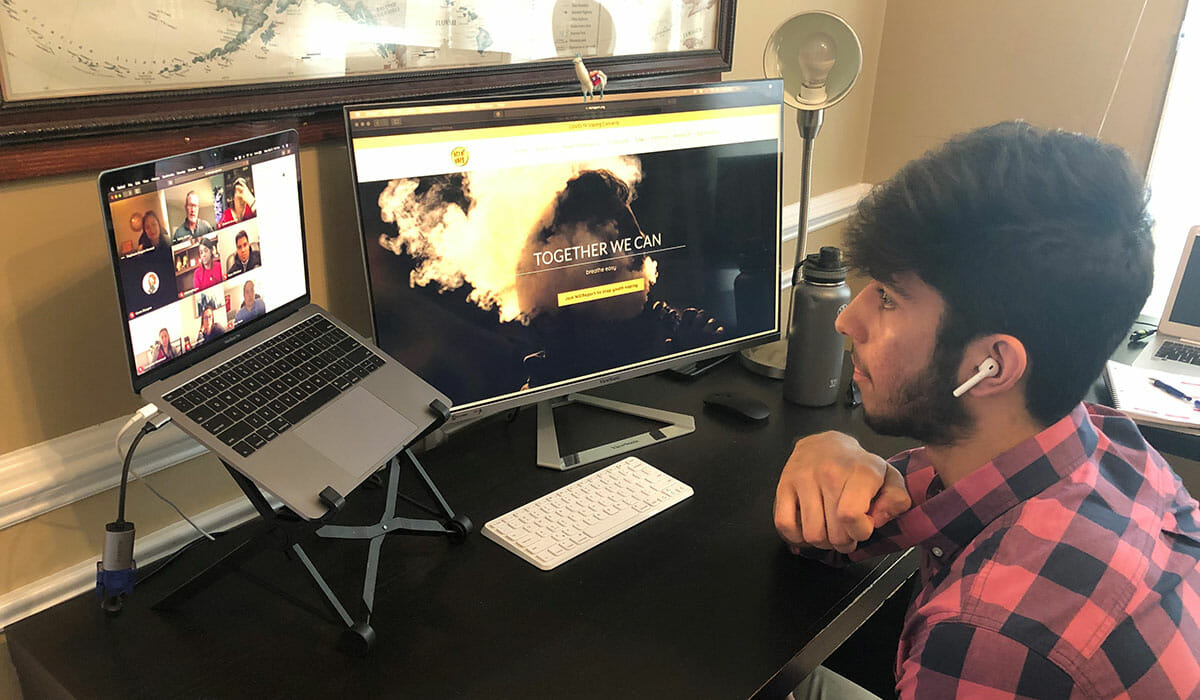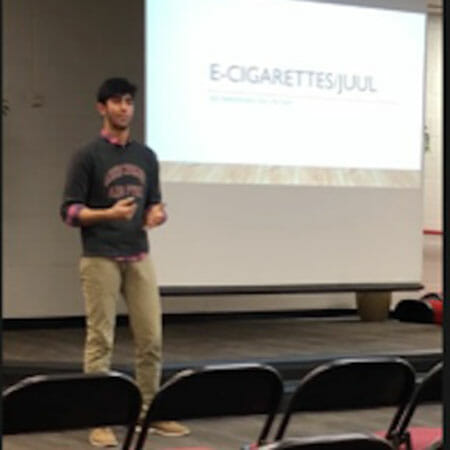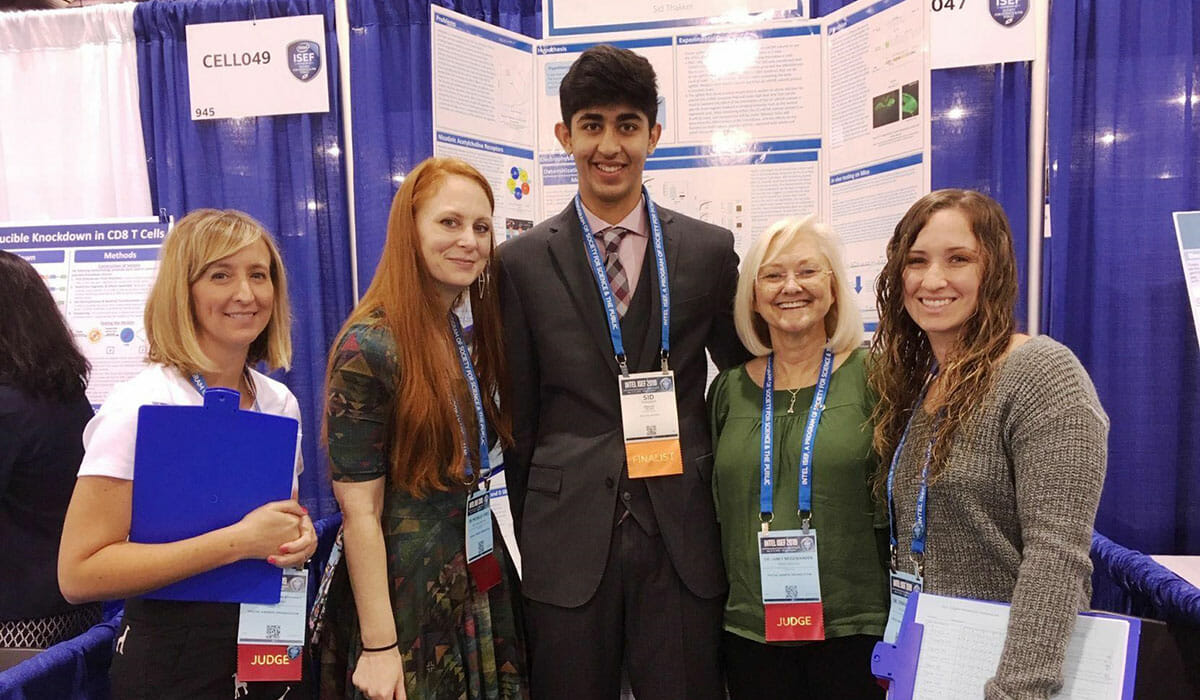Teen Helps Combat Nicotine Addiction Through Nonprofit

Meet Daily Point of Light Award honoree Sid Thakker. Read his story and nominate an out-standing volunteer or family as a Point of Light.
Not everyone can say that their passions have led to them to positively impact thousands of kids. Sid Thakker, however, can say that his love for biology and economics has led him to not only help fellow teens in his Reston, Va. community, but potentially across the country — and he did it all before he turned 18.
Two years ago, Sid’s award-winning science fair project on nicotine addiction led to him starting the nonprofit Nicreport, with the goal of educating as many high school students as possible on the dangers of nicotine addiction and vaping. Through Nicreport, Sid has created interactive curriculums that have been implemented in biology and health classes within his Fairfax Coun-ty Public School district. So far, the curriculum has reached about 3,000 students in five of the district’s high schools, but by the end of the year, it will be in all 23 of the district’s schools and will reach closer to 60,000 students. Nicreport’s reach goes farther through seminars and its website, which serves as a database for the latest news and research on nicotine addiction and vaping.
Sid is currently working with the National Association of Secondary School Principals to make Nicreport a national organization so its curriculum can be implemented in schools all across the country. The nonprofit has also paired with the Fairfax County Health Department and the Truth Initiative to develop an app that will provide support for those currently trying to kick their nicotine addiction. Aside from his positive impact on fighting addiction, Sid has also used Nicreport to raise over $10,000 to donate to Feeding America.
Describe your volunteer role with Nicreport.
Nicreport is a nonprofit that I created two years ago. The reasoning behind me creating this nonprofit is because of a massive issue, not just at my school, but in practically every school across the country — the issue of vaping. In 2018, we saw this massive vaping epidemic and at the same time, I was creating a science fair project focused on nicotine addiction. I was grateful enough to go to the Intel International Science and Engineering Fair where I won an award from NIDA, or the National Institute on Drug Abuse. That really allowed me to get the connections necessary to create an organization that’s focused on educating the youth on the dangers of vap-ing. We created a new type of curriculum in both biology and health classes, where we create interactive lessons to help teach students on the dangers of vaping.
The biggest issue I saw as a student in our school district is that the education on vaping was lackluster and it didn’t seem the teachers put as much emphasis on it. I came to learn that eve-rything the teachers were teaching was state-mandated, so they didn’t have much say on it. I had grateful enough teachers at my high school who let me work with their curriculum to inter-twine mine. I was able to tweak it a little bit to put my curriculum in place, where we were able to have super interactive lessons to teach students. I also focused on talking at different semi-nars such as PTSA meetings, where I help to educate not just students, but also parents on the dangers that come with vaping. We’ve done a couple seminars. On top of that, my website acts as a database to inform as many students and parents as possible on news related to vaping. For example, during this time, news is being released that COVID-19 and vaping have a strong connection. I’ve taken this time to add information and news articles and research that have show the interaction between the two, and making sure everybody is up to date on the type of information coming out about it.

Why was the issue of vaping important to you?
As a big science person, I really want to create the best types of tools necessary for not just stu-dents, but anybody to feel safe. I was lucky enough to intern at Georgetown University, where I did my nicotine addiction research. I learned about a receptor that primarily causes nicotine addiction. The original project I was working on was focused on smoking, but then I looked back at my school and I noticed that a couple of my classmates had succumbed to this [vaping] addiction. It was really worrisome for me to be looking at friends and family who had been tak-en over by this somewhat small device, even though it shouldn’t even be an issue for anybody. It should be banned. I took the liberty to create an organization that can help these kids learn about it so they don’t even fall into the trap in the first place.
Do you have any long-term or short-term goals for the future of your nonprofit?
Obviously the end goal for my organization is to impact as many students as possible. I’m working right now with the National Association of Secondary School Principals. They’re help-ing me create my organization into a national organization to where I can have my curriculum in the hands of schools all over the country, from California, to Texas, to New York. To me, that is the next step. We’ve seen amazing results at my high school and the other surrounding high schools, and we would love to replicate that in every high school across the country.
Why did you choose to also raise money for Feeding America?
Feeding America has been something I’ve volunteered for in the past, and I also know a lot about. Especially during COVID, when unemployment was at an all-time high, a lot of people in Reston were out of jobs and going to local food shelters. It was really hard to see this, espe-cially as a person who has spent their entire life in Reston. I decided to donate all this money to Feeding America to help people who’ve lost their jobs and give them the relief they need, espe-cially during this terrible time.
Are there any future partnerships, programs, or events that you are excited about?
For the past couple of months, I’ve been working with Fairfax County Health Department and we have an amazing partnership going on. This month, we’re releasing a product that is going to be targeted for students that are also paired with this organization called Truth Initiative. The program is called This is Quitting, and it’s an amazing resource for students who have already been addicted to nicotine and want a way to stop. This is the best place for students to be look-ing toward in the Fairfax County Public School District.
This is Quitting is an app software where kids can interact with a chat bot where they can get information from a software that can determine its needs. We want students to be able to learn information from someone who is available 24/7. This chatbot offers different ways for stu-dents to get help, what numbers to call, what hotlines to use, what type of activities they can do to escape the crave, such as going on walks, and they’ll give directions to the nearest trail they can go to. It’s a great way for students to learn about the preventative measures they can take.

What’s been the most rewarding part of your work?
The most rewarding part has definitely been receiving emails from parents whose kids have been through my curriculum. I’ve receive a couple emails from parents thanking me for the work I’m doing, which is really not even close to what I expected this curriculum would cause. A lot of parents are thanking me for bringing the attention to the kids, who then brought the at-tention to their parents so they were able to get the help they need. It’s just incredible to see that as a 17-year-old student, I’m able to impact more than just one life, than myself. It’s in-credible to have reached over 2,000 students when I started this curriculum only a year and a half ago. To me, it shows any kid can do whatever they want to if they put some hard work and dedication toward it.
Why do you think it’s important for others to give back?
I think volunteering is probably the most important thing someone can do. I think especially given these restrictions, even if you’re volunteering online, it’s impacting someone else’s life. When you first volunteer, you don’t think what you’re doing is making that much impact, but when you look at the scope of the organization or the program you’re working for, you’re actu-ally affecting more than one person. You’re affecting an entire family and a community that has been working hard for years trying to develop something. Even your hour or two can really make an impact. I think it’s really important for people to be patient and see it won’t just take a couple days or weeks, but when you give it those months and years, you’ll see that impact and you’ll be happy you stayed with it.
Do you want to make a difference in your community like Sid? Find local volunteer opportunities.
